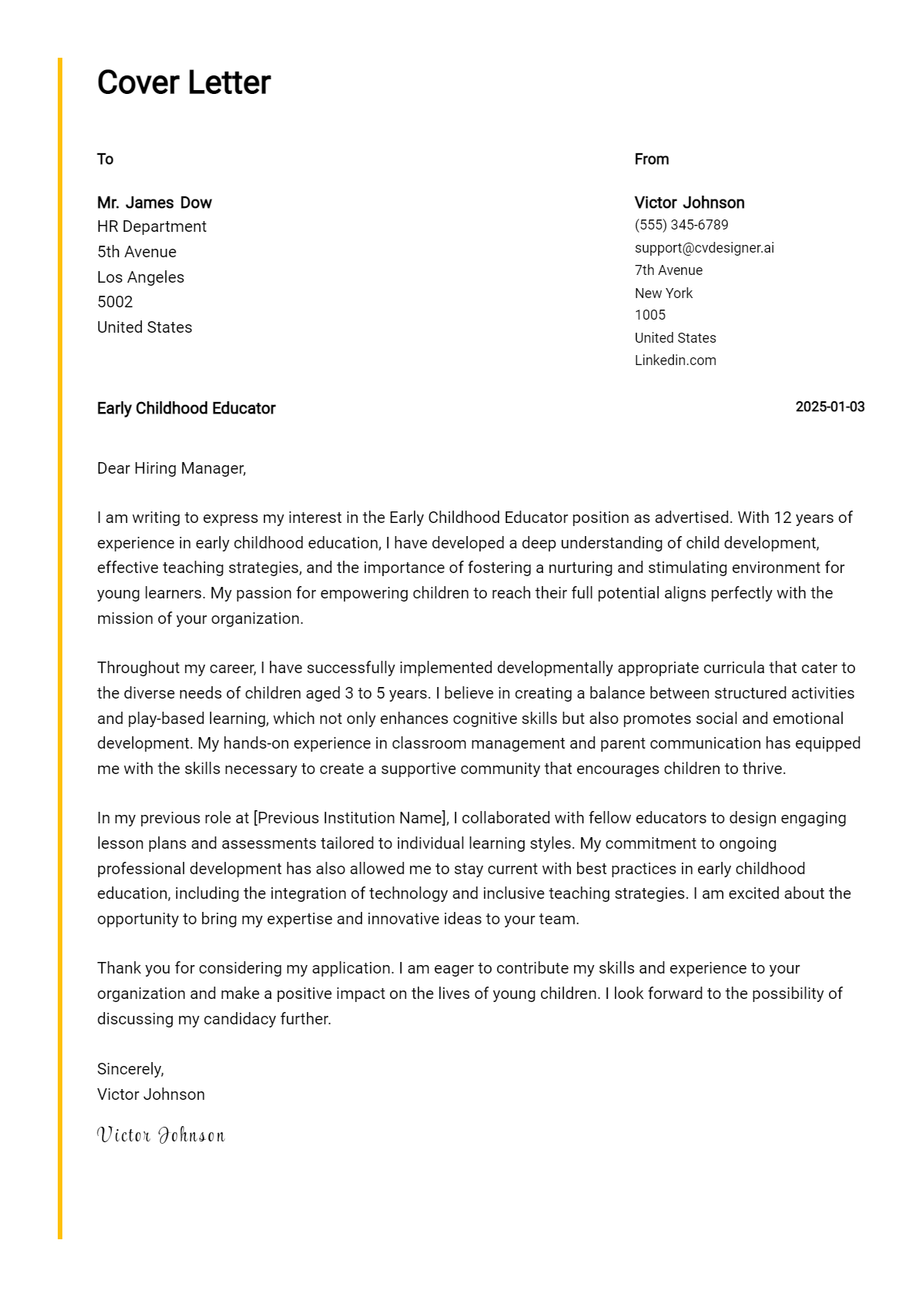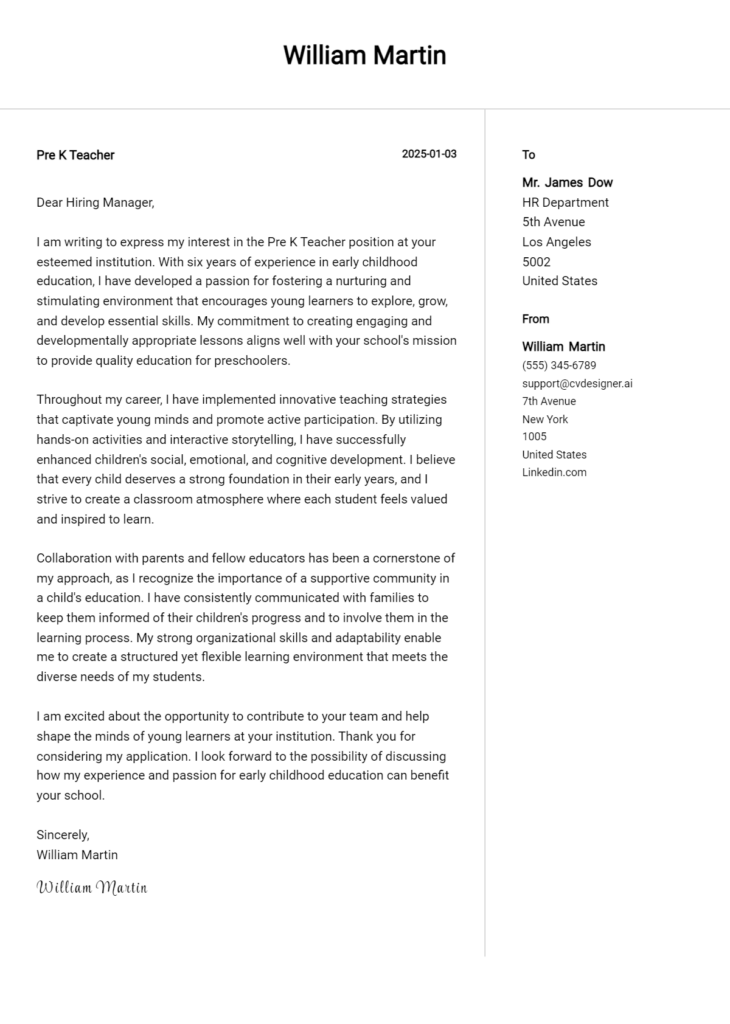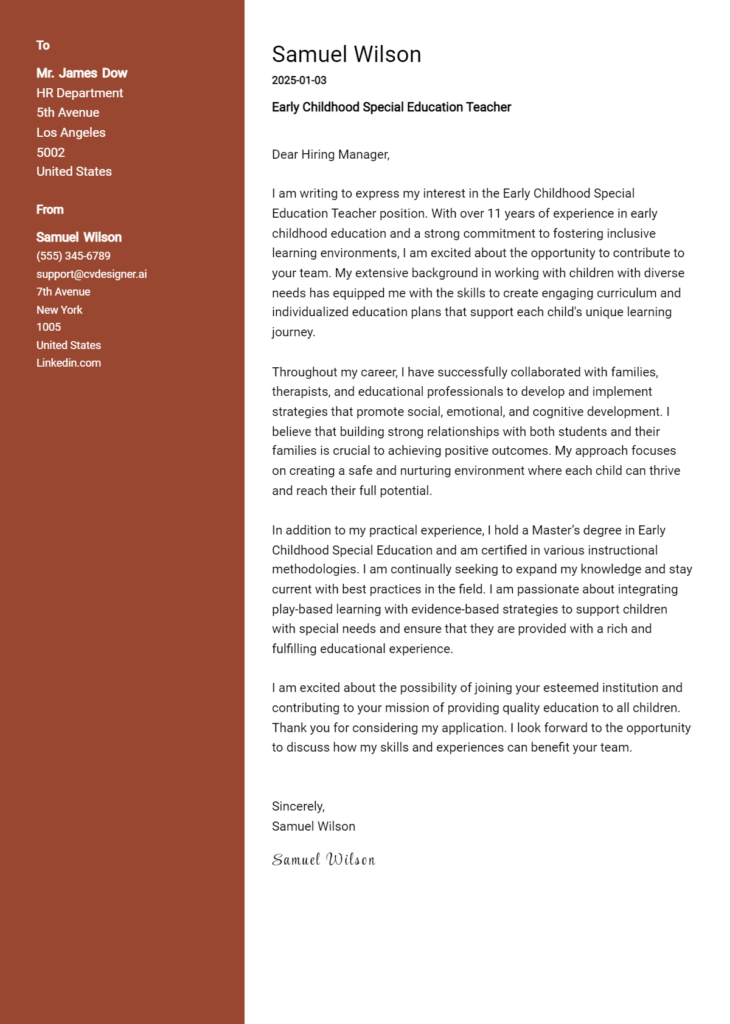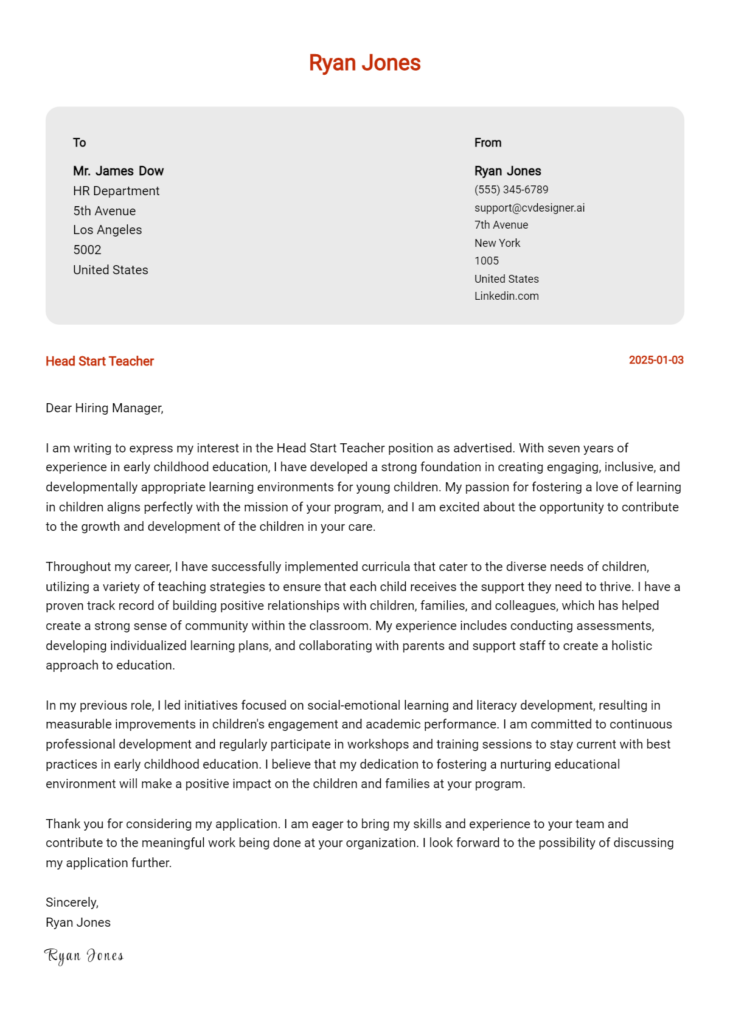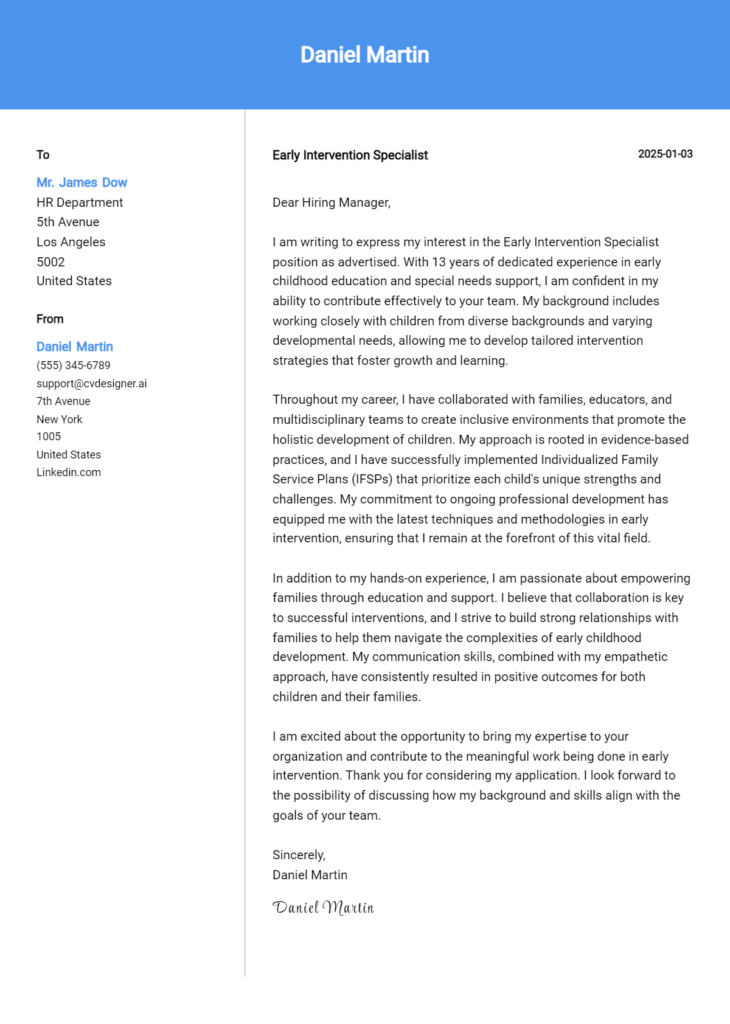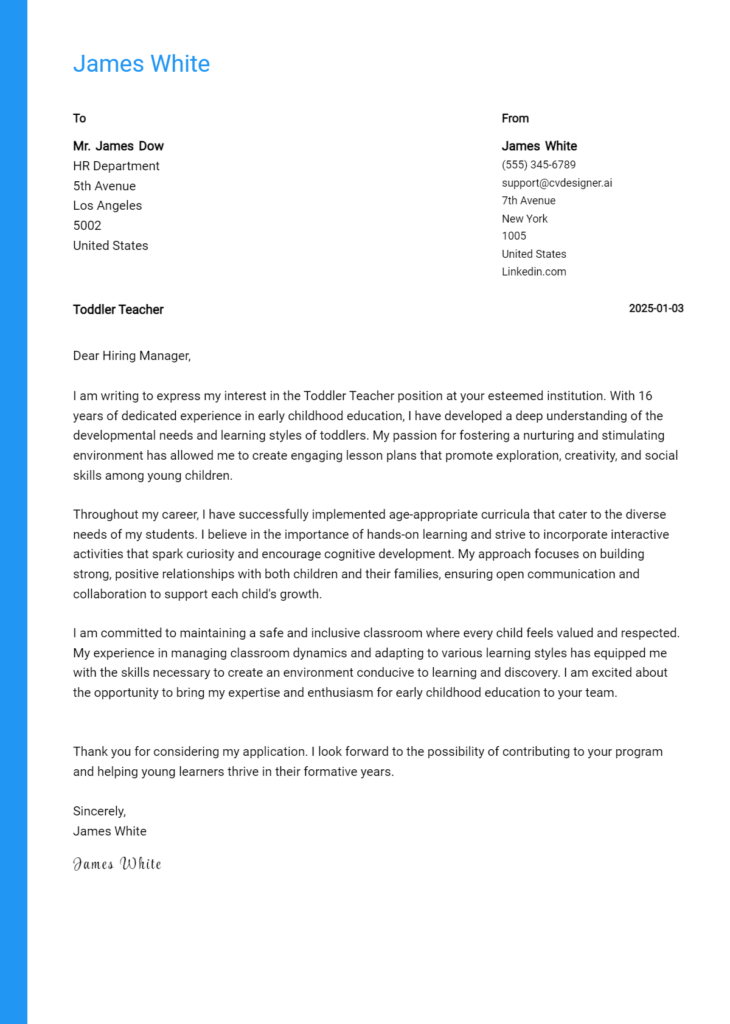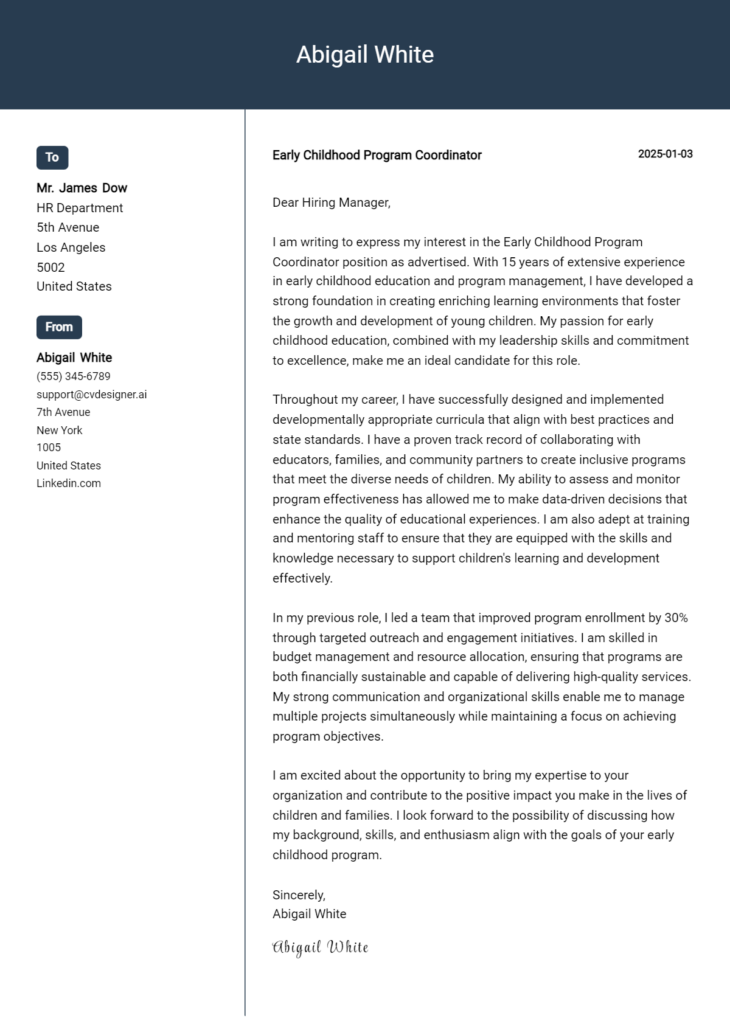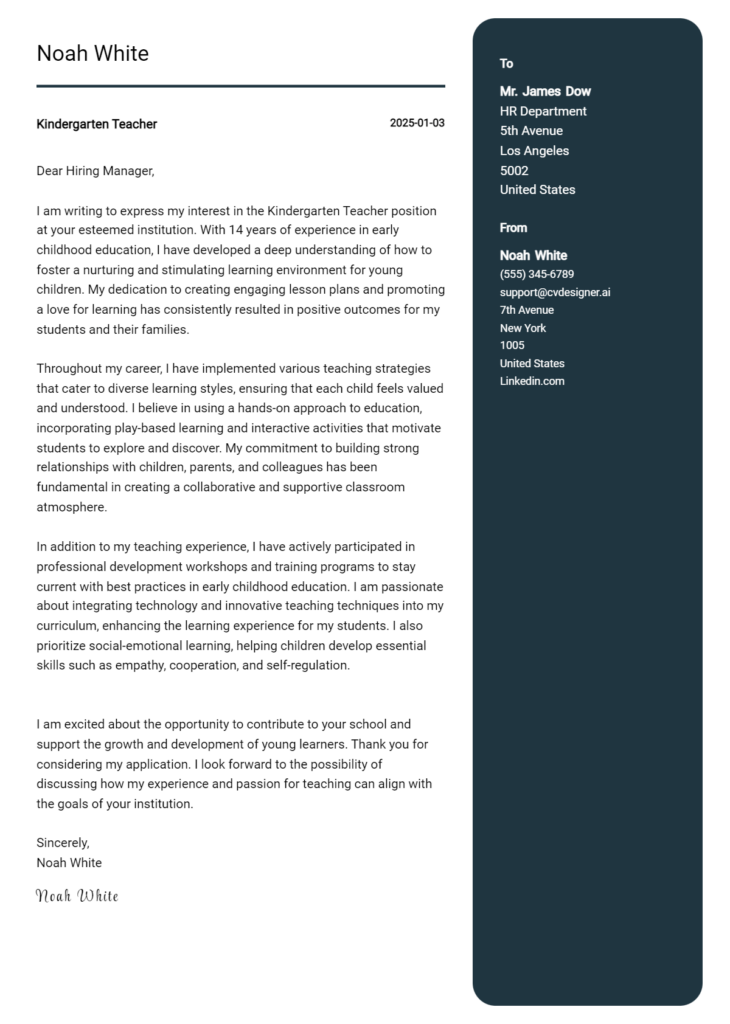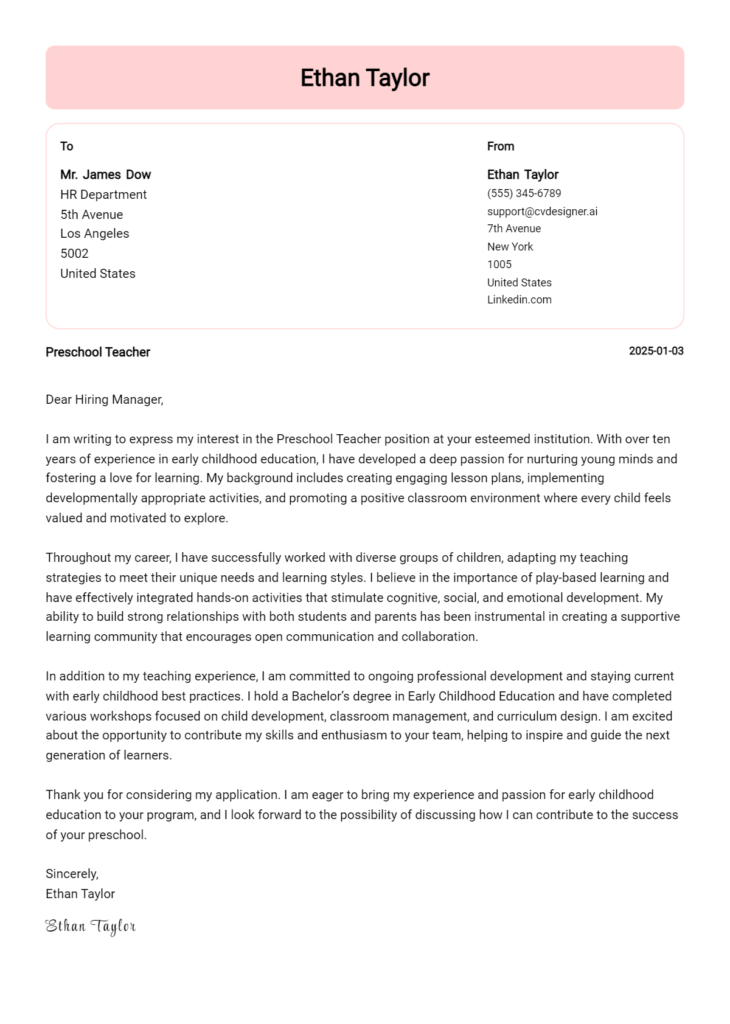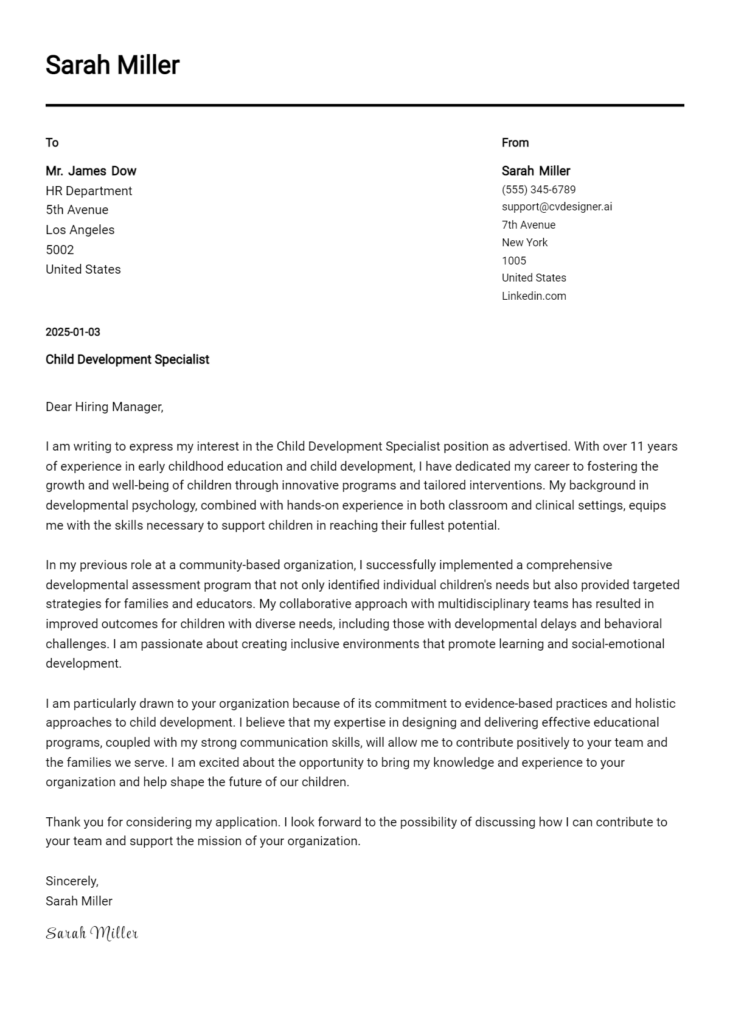Early Childhood Educator Cover Letter Examples
Explore additional Early Childhood Educator cover letter samples and guides and see what works for your level of experience or role.
How to Format an Early Childhood Educator Cover Letter?
Crafting a well-structured cover letter is essential for Early Childhood Educators, as it serves as your first opportunity to make a lasting impression on potential employers. The way you format your cover letter not only reflects your professionalism but also your understanding of the importance of communication and organization—traits that are vital in early childhood education. A thoughtfully organized cover letter showcases your passion for nurturing young minds while illustrating your ability to create a supportive learning environment.
In this guide, we will explore the key components of an effective Early Childhood Educator cover letter, providing you with the tools to highlight your unique qualifications and dedication to fostering growth in young children.
We’ll examine the essential elements of a professional cover letter, including:
- Cover Letter Header
- Cover Letter Greeting
- Cover Letter Introduction
- Cover Letter Body
- Cover Letter Closing
Each section plays a crucial role in representing your skills and commitment to early education. Let’s delve into each part and discover how to make your cover letter stand out in this rewarding field.
Importance of the Cover Letter Header for an Early Childhood Educator
A well-crafted cover letter header is essential for an Early Childhood Educator as it sets the tone for the rest of the application. It serves as the first point of contact between the educator and the potential employer, making clarity and professionalism paramount. The header should include key information such as the applicant's contact details, the date, and the recipient's information, ensuring that the hiring manager can easily reach out. A strong header reflects attention to detail and organization, qualities that are crucial in the field of early childhood education.
Strong Example
Jane Doe 123 Main Street Cityville, ST 12345 janedoe@email.com (123) 456-7890 October 1, 2023 Ms. Susan Smith Director of Human Resources Bright Beginnings Preschool 456 Elm Street Cityville, ST 12345
Weak Example
Jane D. email@domain.com 10/1/23 To Whom It May Concern
The Importance of a Strong Cover Letter Greeting
The greeting of your cover letter is a critical component that sets the tone for the rest of the letter. A well-crafted greeting demonstrates your professionalism and attention to detail, while also allowing you to personalize your communication with the hiring manager. By addressing the recipient directly, you convey respect and establish a connection, which can make a positive impression. To avoid generic greetings that may come off as impersonal, take the time to research the hiring manager's name and title if possible. This small effort can distinguish your application from others and show your genuine interest in the position.
Strong Greeting Example
Dear Ms. Johnson,
Weak Greeting Example
To Whom It May Concern,
The Importance of a Captivating Cover Letter Introduction for an Early Childhood Educator
A well-crafted cover letter introduction is crucial for an Early Childhood Educator as it sets the tone for the entire application. This opening paragraph must capture the hiring manager's attention immediately, express genuine enthusiasm for the position, and highlight key skills or achievements that demonstrate the candidate's suitability for the role. An engaging introduction not only provides insight into the candidate's passion for nurturing young minds but also encourages the reader to delve deeper into the applicant's qualifications. Below are examples of strong and weak cover letter introductions to illustrate the difference.
Strong Example
Dear [Hiring Manager's Name], As a dedicated Early Childhood Educator with over five years of experience in fostering a love for learning in young children, I was thrilled to discover the opportunity to join [School/Organization Name]. My passion for creating engaging and inclusive learning environments, combined with my expertise in child development and curriculum design, aligns perfectly with the values of your team. I am excited about the possibility of contributing to your mission of nurturing creativity and curiosity in every child.
Weak Example
To Whom It May Concern, I am writing to apply for the Early Childhood Educator position. I have some experience working with children, and I think I would be a good fit for your school. I am looking for a job and hope to hear from you soon.
Purpose of the Cover Letter Body for an Early Childhood Educator
The cover letter body for an Early Childhood Educator serves as a pivotal opportunity for candidates to articulate their unique qualifications, experiences, and the value they can bring to the educational institution. This section allows educators to highlight specific projects or accomplishments that demonstrate their teaching philosophy, creativity, and ability to foster a nurturing learning environment. By showcasing relevant skills — such as curriculum development, classroom management, and effective communication with children and parents — candidates can effectively communicate how they will contribute to the growth and development of young learners.
Strong Example
Dear [Hiring Manager's Name], I am excited to apply for the Early Childhood Educator position at [School/Organization Name]. With over five years of experience in early childhood education, I have successfully implemented a play-based curriculum that has increased student engagement by 30%. One of my proudest accomplishments was developing a community gardening project that not only taught children about sustainability but also enhanced their teamwork and problem-solving skills. My background in child development allows me to create tailored lesson plans that meet the diverse needs of students, ensuring each child feels valued and supported. I am eager to bring my passion for fostering a love of learning to your team at [School/Organization Name]. Sincerely, [Your Name]
Weak Example
Dear [Hiring Manager's Name], I want to apply for the Early Childhood Educator job at [School/Organization Name]. I have worked with kids for some time, and I think I would do well in this position. I am good at teaching, and I have done some projects, but I can't remember the specifics right now. I really like working with children and helping them learn new things. I believe I would fit in well at your school. Best, [Your Name]
Importance of the Cover Letter Closing for an Early Childhood Educator
The closing paragraph of a cover letter is crucial for leaving a lasting impression on hiring managers. It serves as a summary of your qualifications, reiterates your enthusiasm for the position, and encourages the reader to take the next steps, such as reviewing your resume or scheduling an interview. A strong closing can reinforce your suitability for the role and demonstrate your proactive attitude, while a weak closing may leave the reader with doubts about your commitment or qualifications.
Strong Example
Thank you for considering my application for the Early Childhood Educator position. With my passion for fostering young minds, coupled with my degree in Early Childhood Education and over five years of hands-on experience, I am excited about the opportunity to contribute to your team. I believe that my approach of creating engaging and nurturing learning environments aligns perfectly with your mission. I would love the chance to discuss how I can support your program further. Please find my resume attached for your review, and I look forward to the opportunity to speak with you soon.
Weak Example
I hope you consider my application for the Early Childhood Educator role. I think I’d be good at it. Here is my resume, and maybe we can talk sometime.
These tips will assist candidates in crafting an effective cover letter for the role of an Early Childhood Educator. A well-written cover letter not only highlights your qualifications but also allows you to showcase your technical skills, problem-solving abilities, teamwork experience, and passion for continuous learning—key attributes that employers seek in this field.
Tips for Writing an Effective Cover Letter
Highlight Relevant Technical Skills
Emphasize your knowledge of early childhood education theories, child development, and curriculum design. Mention specific programs or methodologies you are familiar with, such as Montessori or Reggio Emilia, to demonstrate your technical expertise in early childhood education. Use examples to illustrate how you've applied these skills in past roles.Showcase Problem-Solving Abilities
Provide examples of challenges you've encountered in your teaching experience and how you addressed them. This could involve managing classroom behavior, adapting lesson plans for diverse learners, or creating engaging activities. Highlighting your problem-solving skills will show potential employers that you can handle the dynamic environment of early childhood education.Demonstrate Knowledge of SDLC
While the Software Development Life Cycle (SDLC) may not seem directly related to early childhood education, if you have experience with educational technology or digital tools in the classroom, mention your understanding of how these tools can enhance learning. This can include using apps for tracking student progress or incorporating interactive learning platforms, showcasing your adaptability to new teaching methods.Emphasize Teamwork and Collaboration
Describe your experiences working collaboratively with colleagues, parents, and other stakeholders to create a supportive learning environment. Share specific examples where teamwork has led to improved outcomes for children, such as coordinated activities or joint parent-teacher conferences. This demonstrates your ability to work effectively within a community.Express Passion for Continuous Learning
Convey your commitment to professional development in early childhood education. Mention any workshops, certifications, or continuing education courses you have completed or are currently pursuing. Employers value educators who stay updated on the latest research and best practices, so expressing this passion can set you apart.
For additional assistance in crafting your cover letter, consider using cover letter templates or a cover letter builder to streamline the process and ensure you present your qualifications effectively.
Common Mistakes to Avoid in an Early Childhood Educator Cover Letter
Crafting a compelling cover letter is essential for standing out in the competitive field of early childhood education. Avoiding common mistakes can significantly enhance your chances of landing an interview. Here are some frequent pitfalls and tips to steer clear of them:
- Generic Content: Many applicants use a one-size-fits-all approach. Personalize your letter by addressing the specific school or organization and highlighting why you’re a good fit.
- Lack of Specific Examples: Failing to showcase relevant experiences or skills can weaken your application. Include specific anecdotes that demonstrate your teaching philosophy and success in the classroom.
- Ignoring Formatting Guidelines: Neglecting proper cover letter format can make your letter hard to read. Use a clean and professional layout that enhances readability.
- Spelling and Grammar Errors: Typos and grammatical mistakes can undermine your professionalism. Always proofread your letter or ask a colleague to review it before submission.
- Too Lengthy or Too Brief: Striking the right balance in length is crucial. Aim for concise yet informative content, ideally one page, to keep the reader engaged.
- Failing to Show Passion: A cover letter should reflect your enthusiasm for teaching and commitment to early childhood education. Use language that conveys your passion for shaping young minds.
- Neglecting a Call to Action: Some candidates forget to include a call to action at the end of their letter, missing an opportunity to encourage further communication. Express your desire for an interview and thank them for considering your application.
By steering clear of these common mistakes, you can create a strong cover letter that effectively showcases your qualifications and passion for the role. For more insights, check out cover letter examples to help guide your writing.
Cover Letter FAQs for Early Childhood Educator
What should I include in my cover letter for an Early Childhood Educator position?
When crafting your cover letter for an Early Childhood Educator position, include your educational background, relevant certifications, and any practical experience with children. Highlight specific skills such as patience, creativity, and effective communication. Discuss your teaching philosophy and how it aligns with the institution's values. Don't forget to mention any specialized training, such as first aid or child development courses. Personalize the letter by addressing it to the hiring manager and referencing the specific job posting. Finally, express your passion for fostering children's development and learning in a nurturing environment.
How can I demonstrate my teaching philosophy in my cover letter?
To effectively convey your teaching philosophy in your cover letter, start by defining your core beliefs about early childhood education. Explain how you view the role of play in learning and the importance of building relationships with children. Provide examples of how you've implemented your philosophy in past roles, such as creating engaging lesson plans or fostering a supportive classroom environment. It’s also beneficial to link your philosophy to the specific educational approach of the institution you’re applying to, demonstrating your fit for their culture. Be genuine and reflective, as this will resonate with potential employers.
Should I include any specific achievements in my cover letter?
Yes, including specific achievements in your cover letter is highly beneficial. Focus on quantifiable accomplishments that showcase your impact as an Early Childhood Educator. For example, mention any successful programs you developed, improvements in student engagement, or positive feedback from parents and colleagues. Highlight any awards or recognitions you've received, such as “Teacher of the Year” or successful completion of professional development courses. These achievements not only illustrate your qualifications but also provide concrete evidence of your skills and dedication. Tailor these examples to align with the responsibilities outlined in the job description.
How can I make my cover letter stand out?
To make your cover letter stand out, use an engaging opening that captures attention and reflects your personality. Avoid generic phrases and instead share a brief personal story or insight about your journey into early childhood education. Personalize your letter by researching the school or organization and mentioning specific programs or initiatives that resonate with you. Use a professional yet warm tone throughout, showcasing your passion for working with children. Finally, conclude with a strong closing statement that reiterates your enthusiasm for the role and invites the reader to discuss your application further.
Build your Cover Letter in minutes
Use an AI-powered cover letter builder and have your letter done in 5 minutes. Just select your template and our software will guide you through the process.

